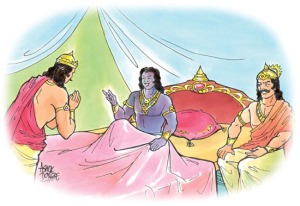
At one point in time Duryodhana was completely bereft of ideas as to how to overcome his Pandava cousins. He had tried burning them alive in the palace of wax at Varnavrata, and as if that weren’t enough his nemesis, Bhima had not only managed to escape the wrath of Bakasura at Ekachakra but also managed to kill him instead [Read about that incident here].
It was at this point in time that his maternal uncle Shakuni, unable to see his favorite nephew so despondent and depressed, proposed the idea of getting rid of the Pandavas and making them relinquish their right to the throne of Hastinapura without so much as shedding a drop of blood.
Shakuni was renowned for his skill as a gambler and was such a master of this craft that he was undefeated at the game of dice. Little did his opponents know that he always played with loaded dice and that was the only reason that he never tasted defeat. He therefore decided to make full use of this craft of his to enable Duryodhana to eliminate the threat of his Pandava cousins.
“Invite the Pandavas for a game of dice. Yudhisthira has a weakness for the game of dice, even though he is not a good player. Ask him to throw the dice with me. As you are well aware, nobody in the three worlds is my equal in this game. I will ensure that his kingdom becomes yours before the game is finished” Shakuni told Duryodhana.
For the first time in his life, he believed his opinion mattered and Shakuni also put in a word with his brother in law, the blind king Dhritarashtra to invite the Pandavas to Hastinapura for a friendly game of dice.
Although Dhritarashtra knew that Shakuni was upto some mischief, his unbridled love for his son and his anxiety at Duryodhana’s depressed state forced him to accede to this request.
Thus, the stage was set for one of the most memorable episodes in this great epic.
===============
This post has been written for multiple prompts :
Today’s Author Write Now prompt for Nov 5, 2013 where the post had to include the phrase – for the first time in his life, he knew his opinion mattered
Trifecta Week 102 prompt where the post had to include the following meaning of the word craft – skill in deceiving to gain an end







